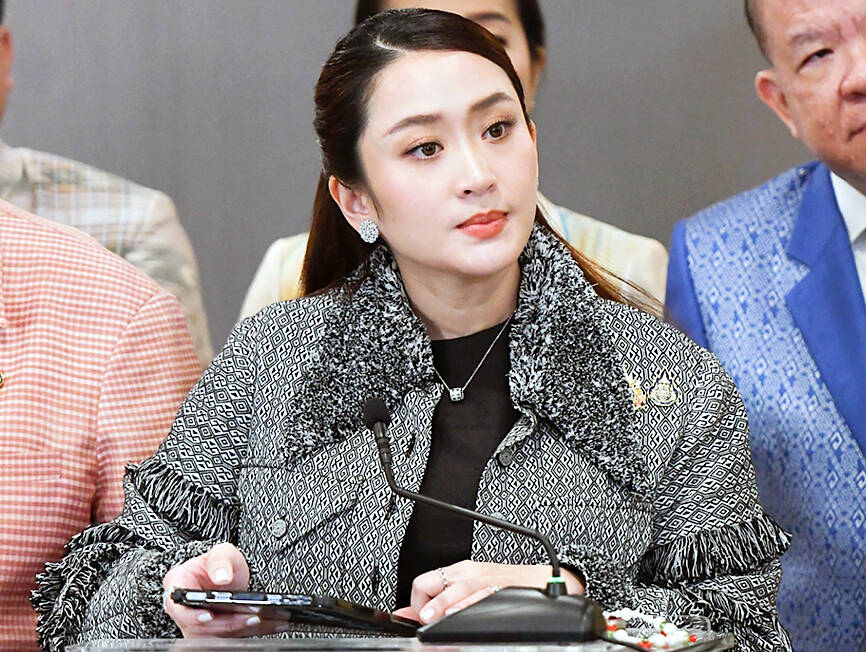Many Thais still disapprove of the government’s plan to allow investments in casinos and the legalization of online gambling as Thai Prime Minister Paetongtarn Shinawatra sought to assure citizens the initiative would bring economic benefits.
About 59 percent of respondents said they disagreed with investments in both casinos and so-called entertainment complexes in Thailand, according to the Jan. 20-21 survey by the National Institute of Development Administration (NIDA).
About 29 percent said they agreed with both casinos and the large venues they would be housed in, while the rest preferred only having one of the two, the survey published on yesterday showed. The nationwide poll of 1,310 Thais aged 18 and above has a margin of error of 3 percent, NIDA said.

Photo: EPA-EFE/Royal Thai Government Handout
About 69 percent of respondents also disagreed with the government’s plan to legalize online gambling to support casinos, while the rest were in agreement, the poll showed.
Opposition has been growing among Thais as the government pushes ahead with the initiative. Last week, a group of Thais attending a provincial election campaign rally in northeastern Si Sa Ket paraded banners saying casinos and online gambling would harm future generations.
In response, Paetongtarn said on Saturday that entertainment complexes will be the nation’s new “man-made tourist destination,” and they would help create jobs and generate new income to help boost economic growth.
She also said negative sentiments among Thais were understandable and the government would seek to address public concerns.
Earlier this month, Thailand’s Cabinet approved in principle a bill to legalize casinos, which the government pitched as a major step to spur tourism and tackle rampant illegal gambling in the Southeast Asian nation.
The bill proposes that casinos be housed within large entertainment venues, which could also include hotels, convention centers and amusement parks. Thailand can emerge as a major player in the global gaming industry if casinos become fully operational in about six years, Citigroup Inc said last year.

TARIFFS: The global ‘panic atmosphere remains strong,’ and foreign investors have continued to sell their holdings since the start of the year, the Ministry of Finance said The government yesterday authorized the activation of its NT$500 billion (US$15.15 billion) National Stabilization Fund (NSF) to prop up the local stock market after two days of sharp falls in reaction to US President Donald Trump’s new import tariffs. The Ministry of Finance said in a statement after the market close that the steering committee of the fund had been given the go-ahead to intervene in the market to bolster Taiwanese shares in a time of crisis. The fund has been authorized to use its assets “to carry out market stabilization tasks as appropriate to maintain the stability of Taiwan’s

STEEP DECLINE: Yesterday’s drop was the third-steepest in its history, the steepest being Monday’s drop in the wake of the tariff announcement on Wednesday last week Taiwanese stocks continued their heavy sell-off yesterday, as concerns over US tariffs and unwinding of leveraged bets weighed on the market. The benchmark TAIEX plunged 1,068.19 points, or 5.79 percent, to 17,391.76, notching the biggest drop among Asian peers as it hit a 15-month low. The decline came even after the government on late Tuesday authorized the NT$500 billion (US$15.2 billion) National Stabilization Fund (國安基金) to step in to buoy the market amid investors’ worries over tariffs imposed by US President Donald Trump. Yesterday’s decline was the third-steepest in its history, trailing only the declines of 2,065.87 points on Monday and

TARIFF CONCERNS: The chipmaker cited global uncertainty from US tariffs and a weakening economic outlook, but said its Singapore expansion remains on track Vanguard International Semiconductor Corp (世界先進), a foundry service provider specializing in producing power management and display driver chips, yesterday withdrew its full-year revenue projection of moderate growth for this year, as escalating US tariff tensions raised uncertainty and concern about a potential economic recession. The Hsinchu-based chipmaker in February said revenues this year would grow mildly from last year based on improving supply chain inventory levels and market demand. At the time, it also anticipated gradual quarter revenue growth. However, the US’ sweeping tariff policy has upended the industry’s supply chains and weakened economic prospects for the world economy, it said. “Now

Six years ago, LVMH’s billionaire CEO Bernard Arnault and US President Donald Trump cut the blue ribbon on a factory in rural Texas that would make designer handbags for Louis Vuitton, one of the world’s best-known luxury brands. However, since the high-profile opening, the factory has faced a host of problems limiting production, 11 former Louis Vuitton employees said. The site has consistently ranked among the worst-performing for Louis Vuitton globally, “significantly” underperforming other facilities, said three former Louis Vuitton workers and a senior industry source, who cited internal rankings shared with staff. The plant’s problems — which have not